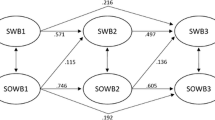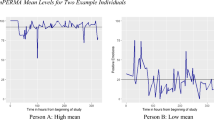Abstract
Recent research has reported high stability for subjective well-being over periods as long as 9 years, concluding that well-being is essentially unaffected by environmental change. Other research has suggested well-being is responsive to change in life circumstances, and appropriate for use as an adaptational outcome variable. The present research examined the stability of well-being over short periods (3–6 months) using a range of well-being measures. Two different samples, mothers with young children and elderly persons, provided assessments of well-being and every day stressors (hassles) on three occasions, three months apart, as well as the personality measure, sense of coherence. Results demonstrated high consistency in well-being, but also found it to be influenced by environmental events and personality. With prior well-being controlled, current well-being was predicted by current hassles but not by past hassles. Coherence explained limited variance in current well-being with pror well-being controlled. Of the three factors, prior well-being, current hassles, and coherence, prior well-being was the strongest predictor of present well-being. These findings were consistent across the range of well-being measures, and replicated across the samples. Implications for the use of well-being as an adaptational outcome are discussed.
Similar content being viewed by others
References
Andrews, F. M. and Withey, S. B.: 1976, Social Indictors of Well-being: American's Perception of Life Quality (Plenum Press, New York).
Antonovsky, A.: 1979, Health, Stress and Coping (Jossey-Bass, San Francisco).
Antonovsky, A.: 1983 ‘The sense of coherence: Development of a research instrument’, Newsletter and Research Reports, W. S. Schwartz Research Centre for Behavioral Medicine, Tel Aviv University, Israel.
Antonovsky, A.: 1985, The Sense of Coherence Scale. Unpublished documents, Ben-Gurion University, Israel.
Antonovsky, A.: 1987, Unraveling the Mystery of Health (Jossey-bass, San Francisco).
Atkinson, T.: 1982, ‘The stability and validity of quality of life measures’, Social Indicators Research 10, 113–132.
Baur, P. and Okun, M.: 1983, ‘Stability of life satisfaction in late life’, The Gerontologist 23, 261–265.
Brickman, P., Coates, D., and Janoff-Bulman, R.: 1978, ‘Lottery winners and accident victims: Is happiness relative?’, Journal of Personality and Social Psychology 36, 917–927.
Campbell, A., Converse, P., and Rodgers, W.: 1976, The Quality of American Life (Sage, New York).
Chamberlain, K.: 1988, ‘On the structure of subjective well-being’, Social Indicators Research 20, 581–604.
Chamberlain, K. and Zika, S.: 1990, ‘The minor events approach to stress: Support for the use of daily hassles’, British Journal of Psychology 81, 469–481.
Costa, P. T. and McRae, R. R.: 1980, ‘Influence of extraversion and neuroticism on subjective well-being: Happy and unhappy people’, Journal of Personality and Social Psychology 38, 668–678.
Costa, P. T., McRae, R. R., and Norris, A. H.: 1981, ‘Personal adjustment to aging: Longitudinal prediction from extraversion and neuroticism’, Journal of Gerontology 36, 78–85.
Costa, P. T., McRae, R. R., and Zonderman, A. B.: 1987, ‘Environmental and dispositional influences on well-being: Longitudinal follow-up of an American national sample’, British Journal of Psychology 78, 299–306.
Costa, P. T., Zonderman, A. B., McRae, R. R., Cornoni-Huntley, J., Locke, B. Z., and Barbano, H. E.: 1987, ‘Longitudinal analyses of psychological well-being in a national sample: Stability of mean levels’, Journal of Gerontology 42, 50–55.
DeLongis, A., Coyne, J. C., Dakof, G., Folkman, S., and Lazarus, R. S.: 1982, ‘Relationship of daily hassles, uplifts, and major life events to health status’, Health Psychology 1, 119–136.
Diener, E.: 1984, ‘Subjective well-being’, Psychological Bulletin 95, 542–575.
Dohrenwend, B. S., Dohrenwend, B. P., Dodson, M. and Shrout, P. E.: 1984, ‘Symptoms, hassles, social supports, and life events: Problems of confounded measures’, Journal of Abnormal Psychology 93, 222–230.
George, L. K. and Maddox, G. L.: 1977, ‘Subjective adaptation to loss of the work role: A longitudinal study’, Journal of Gerontology 32, 456–462.
Headey, B. and Wearing, A.: 1988, ‘A stocks and flows model of subjective well-being’, Paper presented to the XXIV International Congress of Psychology, Sydney, Australia.
Kammann, R. and Flett, R.: 1983, ‘Affectometer 2: A scale to measure current level of general happiness’, Australian Journal of Psychology 35, 257–263.
Kanner, A. D., Coyne, J. C., Schaefer, C., and Lazarus, R. S.: 1981, ‘Comparison of two modes of stress measurement: Daily hassles and uplifts versus major life events’, Journal of Behavioral Medicine 4, 1–39.
Kozma, A. and Stones, M. J.: 1983, ‘Predictors of happiness’, Journal of Gerontology 38, 626–628.
McNeil, J. K., Stones, M. J., and Kozma, A.: 1986a, ‘Subjective well-being in later life: Issues concerning measurement and prediction’, Social Indicators Research 18, 35–70.
McNeil, J. K., Stones, M. J., and Kozma, A.: 1986b, ‘Longitudinal variation in domain indicators of happiness’, Social Indicators Research 18, 119–124.
Ormel, J.: 1983, ‘Neuroticism and well-being inventories: Measuring states or traits?’, Psychological Medicine 13, 165–176.
Palmore, E. and Kivett, V.: 1977, ‘Change in life satisfaction: A longitudinal study of persons aged 46–70’, Journal of Gerontology 32, 311–316.
Reker, G. T. and Wong, P. T.: 1984, ‘Psychological and physical well-being in the elderly: The Perceived Well-Being scale (PWB)’, Canadian Journal on Aging 3, 23–32.
Stones, M. J. and Kozma, A.: 1986, ‘Happiness and activities as propensities’, Journal of Gerontology 41, 85–90.
Viet, C. T. and Ware, J. E.: 1983, ‘The structure of psychological distress and well-being in general populations’, Journal of Consulting and Clinical Psychology 51, 730–742.
Author information
Authors and Affiliations
Rights and permissions
About this article
Cite this article
Chamberlain, K., Zika, S. Stability and change in subjective well-being over short time periods. Soc Indic Res 26, 101–117 (1992). https://doi.org/10.1007/BF00304394
Received:
Issue Date:
DOI: https://doi.org/10.1007/BF00304394




